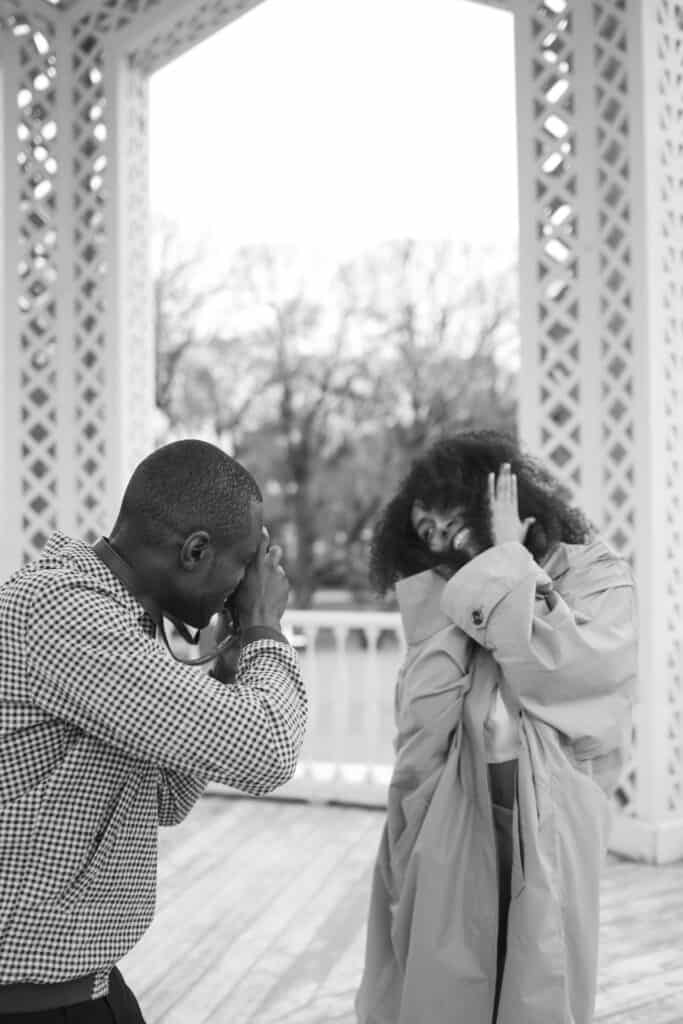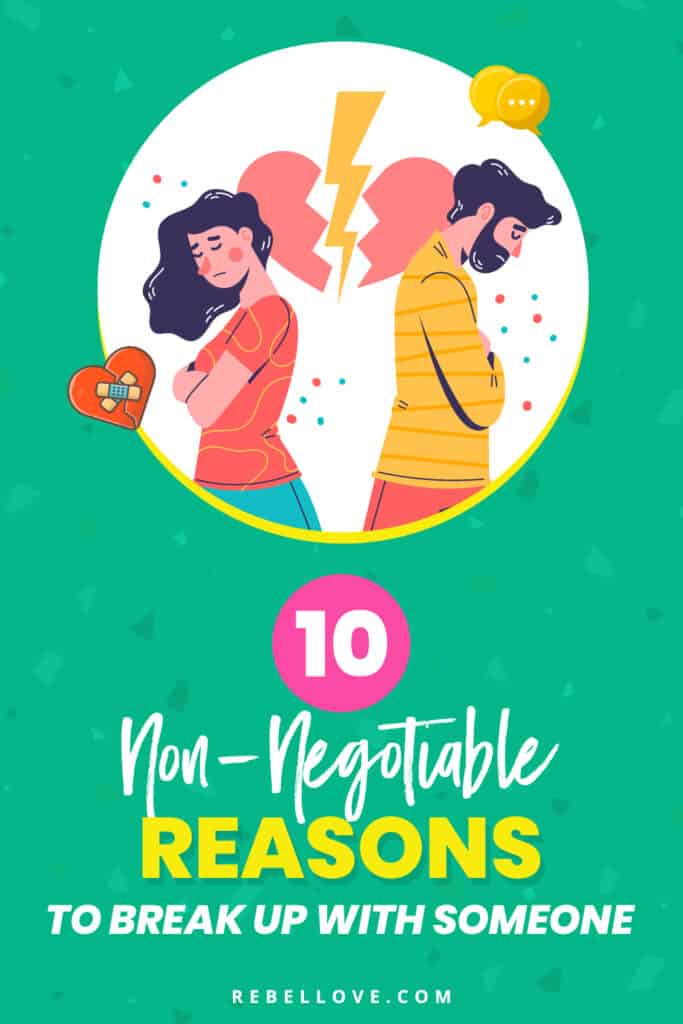This post may contain affiliate links and Rebel Love may be compensated for purchases visitors make through these links. We only promote products and services we really care about and that we think are useful. Read the full policy here.
Choosing a partner is one of the most important decisions you’ll ever make, which is why I have a cardinal rule when it comes to relationships: trust your gut. I didn’t always follow this advice, which is why my previous relationships came to a climactic end. I ignored, rather than explored, my resistance towards relationships and partners, and rather than breaking up when the time came, I thought, “people change, right?”
Wrong!
Instinct, I’ve learned, is like a muscle – the more you use it, the stronger it gets – and if you’re anything like me, being in the wrong relationship over and over again can make it difficult to trust that gut feeling (let alone identify it when it shows up!).
How does one identify a good relationship?
Relationship experts have connected certain foundational characteristics with longevity and well-being:
 Photo from Pexels
Photo from Pexels
🖤 Honesty, trust, and respect
🖤 Emotional intimacy and safety
🖤 Open communication
🖤 The ability to compromise for the well-being of the relationship
Although this list is desirable, it’s also quite vague.
Honesty, trust, and respect sound like straightforward concepts; however, their presence looks different depending on the nature of the relationship.
Take James and I for instance: trust for us does not look the same as for a strictly monogamous couple. When he messages another woman, I find it exciting, whereas someone else could take it as a profound act of disrespect.
The same can be said for emotional intimacy. James and I regularly express our feelings for one another through words and physical contact and practice healthy communication when things get heated. Another couple may find more fulfillment in laughing together or bonding over a shared activity or experience and may resolve conflict by bringing in a third party for assistance.
All of that to say: relationships are nuanced and determining if you’re in a good one depends on your base needs and life goals.
If you’re currently in a relationship and are trying to determine if it’s right for you, here are a few questions to reflect on:
🖤 Is there an element of your relationship/partner that is causing you trouble or doubt? If so, is it something that can be communicated and worked out? (Do you even want to work it out?)
🖤 How does your relationship/partner impact your mental health?
🖤 Does your relationship/partner bring out the best in you?
🖤 How do your most trusted confidants feel about your relationship/partner?
The Rough Patch
I want to take a moment to acknowledge the normalcy of the “rough patch” in long-term relationships. Be it romantically, emotionally, sexually, or otherwise, all relationships have their highs and lows, and timelines may vary. Which begs the question:
How long is too long?
Conflict is never fun, but obstacles can be overcome when each party is willing to communicate, compromise, and take responsibility for their role in the relationship. But there are certain conflicts – be it internally or with our partner -that can impact the quality of the relationship or the commitment we have to it. Which is why I want to discuss 10 non-negotiable reasons to break up with someone.
Why are they non-negotiable?
 Photo from Pexels
Photo from Pexels
As mentioned, relationships are nuanced and that’s because people are nuanced.
We each walk around with a set of beliefs, priorities, needs, and desires. When we enter into a relationship, the hope is that these things are recognized, and negotiations are made to ensure the relationship is fulfilling to both parties, without compromising anyone’s welfare. Sometimes, however, an imbalance can occur that has consequences for one or both partners.
You see, not everyone is equipped with the right skills or tools to maintain a healthy relationship; however, that lack of skill is not the partner’s responsibility to bear. The following non-negotiables create risk of dependency, neglect, isolation, loneliness, and/or danger – attributes that are detrimental to an individual’s self-esteem and quality of life.
It’s important we take stock of what we’re exposing our hearts and minds to, in order to dodge the wrong relationships and nurture the right ones.
Here are your non-negotiable reasons to break up with someone!
🖤 You’re Searching for a Reason to Leave
If you’re waiting for the sign to call it quits, HERE IT IS. Looking for a reason to break up with someone usually means the relationship is already over.
Of course, it’s possible that wanting to end a relationship is due to fear of commitment or some other personal block surrounding relationships. Explore this.
But if you find you’re holding on out of guilt or cowardice, know that staying in a relationship you no longer desire will backfire in the long run.
When we hold on to a relationship for the sake of someone else (or because we’re too intimidated by the breakup convo), we inevitably pull away from our partner. This leads to unmet needs, resulting in confusion and unnecessary hurt.
The right step here is simple:
Give yourself permission to let the relationship go. Find empowerment in this decision. You’re doing the right thing for you and your partner.
🖤 You Aren’t Friends
Being friends does not mean you have to share every waking detail with one another, nor does it imply you have all the same interests. I am not asking you to enmesh yourselves or be your partner’s best friend, I just want to know:
Do you get along?
Do you enjoy spending time together?
If your answers are “no”, you may need to rethink your relationship status. If you can’t spend any length of time together amicably, why maintain it?
Being friends with your partner builds intimacy and emotional safety. It creates a secure container for vulnerability and growth. If there’s no room for authenticity or expansion, it’s a deal breaker.
🖤 Lack of Commitment to the Capacity You Require

Each of us has an ideal relationship in our mind, and it’s easy to project those desires onto a potential partner. Sharing needs and expectations for the relationship is vital to building a fulfilling relationship, including what commitment means to you. Reflecting on your life and relationship goals will help in this process.
If your current beau has shown no sign of committing, or they’re wishy-washy about what they want, it’s best you let them go. It’s not up to you to wait around until they figure it out.
Similarly, if you’re in a long-term relationship, but you or your partner have lost the motivation to fix things, free yourselves. If you don’t want to put the effort in now, there’s little hope for the future.
The individual who is waiting for commitment will suffer most. By staying with someone who can’t or won’t commit, you assist in an atmosphere of uncertainty. There’s the chance the relationship won’t evolve; there will be an overhanging fear of the person leaving; you won’t be able to build something, as they don’t share the same vision for the partnership.
Do your heart a favor and find someone who appreciates you and is excited about building a future together.
🖤 Grand Betrayals of Trust
Trust in a relationship means there is a feeling of safety, mutual reliability, and you’re confident your partner will uphold the agreements of the relationship.
People screw up and genuinely feel remorse. I get this. I don’t want to be the judge of what defines a grand betrayal of trust. That’s for you to decide – so let me ask:
Are there certain acts or behaviors, etc., that you cannot compromise on? And have these been made known to your partner?
If your partner is aware of these boundaries and transgresses anyway (and the context of their transgression doesn’t redeem the transgression itself), get out of there.
If you’ve stated your limits clearly, and your partner disregards those limits anyway, this is an act of disrespect towards you and the relationship. Don’t let their selfishness take precedence over your emotional well-being.
🖤 Sexual Incompatibility
Sexual incompatibility is common in relationships. It’s also natural that big life changes – such as having a baby, losing a job, grieving the loss of a family member, periods of low self-esteem, going through menopause, dealing with a medical issue, etc. – will have an impact on desire. Giving your partner love and grace, and asking them what they need during this time, will create a stronger bond.
But sex and intimacy mean different things to different people, which is something that should be communicated. I’m happy to inform you that it is possible to have a fulfilling relationship despite varying levels of desire. In saying that, if sexual incompatibility is causing long-term tension and frustration, and it cannot be worked out via intervention (i.e., communication, seeking an expert, exploration, opening the relationship, etc.), it’s unrealistic to think anyone should remain in a pleasure-free and sexually incompatible partnership.
🖤 You Don’t Share the Same Values
Experts say that having shared fundamental beliefs and priorities in a relationship helps create emotional safety and ease.
When you and your partner are on the same page about things like parenting, finances, political or spiritual views (belief systems), intimacy, life goals and priorities, conflict resolution and life decisions are easier to navigate.
If you find you’re constantly butting heads with your partner because there’s a disconnect in core values, causing mutual hurt, this constitutes a good enough reason to break up.
Shared values matter in the success of any relationship. Your future love life should include a partner that plays for the same team.
🖤 Emotional Abuse
 Photo from Pexels
Photo from Pexels
It can be difficult to notice when we’re in an emotionally abusive relationship.
When relationships start dragging you down, consumed by negative energy, and begin weighing on your mental health, it’s a sign that you need distance. Permanently. Here are a few questions to help you reflect and realize where things are at:
Have you ever felt like your partner doesn’t know you? Are you hiding pieces of yourself from them in order to make the relationship work? Are you having trouble recognizing yourself?
Are your partner’s moods stifling your joy? Do they dismiss your feelings? Are they judgmental towards you and the people in your life?
We all deserve empathy, compassion, and acceptance. A relationship that is devoid of these elements can have repercussions on our worldview and self-perception. Here are a few common signs of an emotionally abusive partner:
They gaslight you + Shift blame
I call these people “crazy makers.” By manipulating their partner, they make them question their sense of reality. They do so by lying or using tactics that make their partner doubt themselves and their own perception.
An example:
You see your partner’s phone light up, and notice it’s a text from another woman/man and it’s sexual in nature. When you confront your partner about it, they respond by telling you that you misread the text. They are annoyed and start blaming you for invading their privacy. They might tell you you’re crazy and that you’re making a big deal out of nothing. Your concern turns into feelings of shame, guilt, and/or sorrow. You apologize to them, accept the rationale for your partner’s intentions, and never resolve the issue with the text.
They are possessive, critical of your other relationships + isolate you
An emotional abuser will oftentimes cut off your support systems by criticizing your friends/family, trying to turn you against them or discourage you from contacting them. Your partner will make you believe that they are all you need.
In extreme cases, they may physically or financially bar you from being independent. For example, they will insist on going everywhere with you, and make you feel guilty otherwise. They may take over the finances and restrict your spending.
They have extreme, UNPREDICTABLE MOOD swings + Use harmful language
Does your partner have unpredictable outbursts? Do those outbursts frighten you, or lead to hateful remarks about your character?
Emotional abusers tend to attack their partner’s self-worth, convincing them they are lucky to have someone that loves them. Their unpredictable mood swings and yelling may leave you feeling afraid and cause you to tip-toe around them to avoid conflict. This fear creates a power dynamic in the relationship.
Reality of Control
All of these examples are ways emotionally abusive people maintain control over their partners. If you notice these behaviors or have friends/family that express concern for you, the reasons to break up are hard to deny.
🖤 Dangerous Behaviors
 Photo from Pexels
Photo from Pexels
In the same vein as the emotional abuser, people who blatantly put you in harm’s way or exhibit dangerous behavior without considering your safety or feelings should be left alone. This includes people who are physically dangerous to themselves or others or have addictions that they aren’t willing to seek help for.
It is not your responsibility to save someone or convince them to get help for an illness. Your priority is you and your safety. Always.
🖤 Being the Brunt of Unresolved Issues
We all come with baggage; however, that doesn’t give us the right to project it onto others.
When we have unresolved issues or trauma, they can easily seep into our current relationships. Recognizing when we’re triggered by something that isn’t actually related to the situation at hand takes practice. But what happens when someone stops putting focus on self-reflection?
Their partner takes the brunt of their past.
If you are in a relationship and your partner is blaming you for their bad behavior or strong emotional reactions to past events, they should consider speaking to a professional or finding literature on the specific emotion/memory they’re struggling with.
If they undertake this journey, pay attention. If they don’t put the effort into making their life better, or there is no evolution, I suggest letting them go. It may sound harsh, but the only person who can save your partner is your partner. You don’t need to be a punching bag because they are too stubborn to do the work.
Some people are attached to their misery and stuck in their past, that doesn’t mean you have to stay there too.
🖤 It’s Convenient
Are you in a relationship that’s just kind of there? It’s alright and whatever, but that’s it?
Settling…
That’s what you’re doing.
Call me a romantic, but I believe love is expansive. When we settle for something that’s meh, we’re selling ourselves short.
Maybe you’ve convinced yourself you can’t do any better. Maybe you’re avoiding the hassle of the breakup. Maybe the dating world feels scarier now than it did “back then.” Whatever your reasoning is, ask yourself this:
Have you ever fantasized about another life? How about another life with another person?
Do you feel you still want to put the effort in with this person?
Are they your priority? (Are you theirs?)
Intimacy and pleasure are a life source. When you find the right person (or people) to whom you can give yourself too, and who can reciprocate that vulnerable gesture, you will feel a massive soul upgrade!
Your self-worth and joy will increase!
You will feel a sense of support and encouragement!
You will feel validated and desired!
You’ll be living from a place of passion, not convenience.
If you’re currently in a convenient relationship, take distance to figure out what it is you really want. If needed, write down your goals and values, what you enjoy doing, and how a future partner would ideally fit into all of that.
Happily, Ever After
Yes, choosing a life partner is one of the most important decisions you’ll ever make. Knowing what you don’t want holds as much significance as knowing what you do want.
Giving yourself permission to date, to explore love and romance, with the simple goal of paying attention to how different people make you feel, is a very empowering thing. Going in without expectations, but never lowering your standards, supports confidence, reduces bad patterns, and gets you closer to the love life you desire. First and foremost, it puts you more in touch with yourself – the most important relationship of all.
So, here’s to you and your search for love. Remember, you deserve a partner who:
 Photo from Pexels
Photo from Pexels
🖤 Is honest, true and respectful
🖤 Is emotionally intimate and safe
🖤 Practices open communication
🖤 Negotiates and makes compromises for the well-being of the relationship
🖤 Brings out the best version of you
🖤 Is understanding and accepting of your beliefs and priorities (better if they share in them)
🖤 Is committed to you and has common relationship goals
🖤 Encourages growth, and takes responsibility for their own evolution
🖤 You enjoy spending time with
If you find yourself wondering whether you’re in a healthy relationship, don’t hesitate to refer back to these 10 non-negotiable reasons to break up with someone.
Until then,
Happy dating!
Quean Mo xx